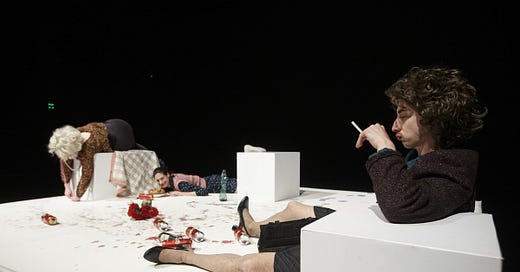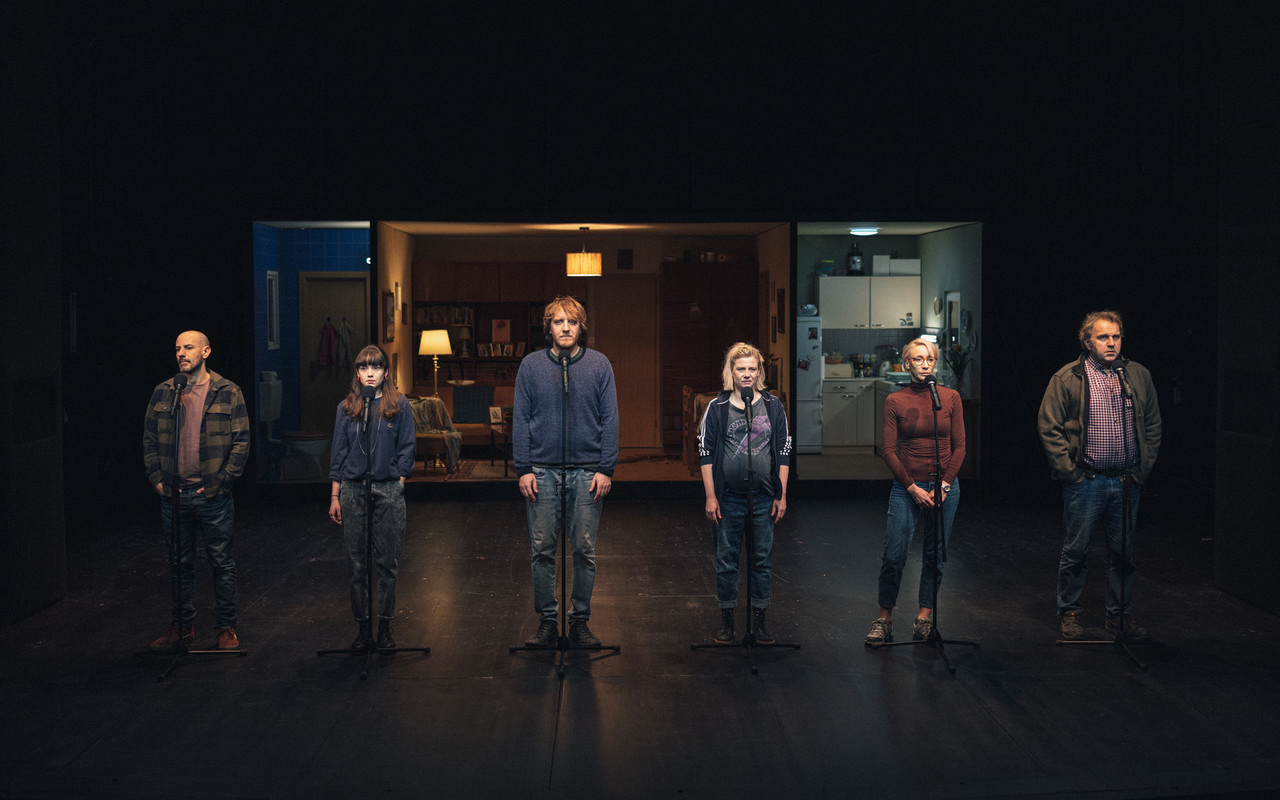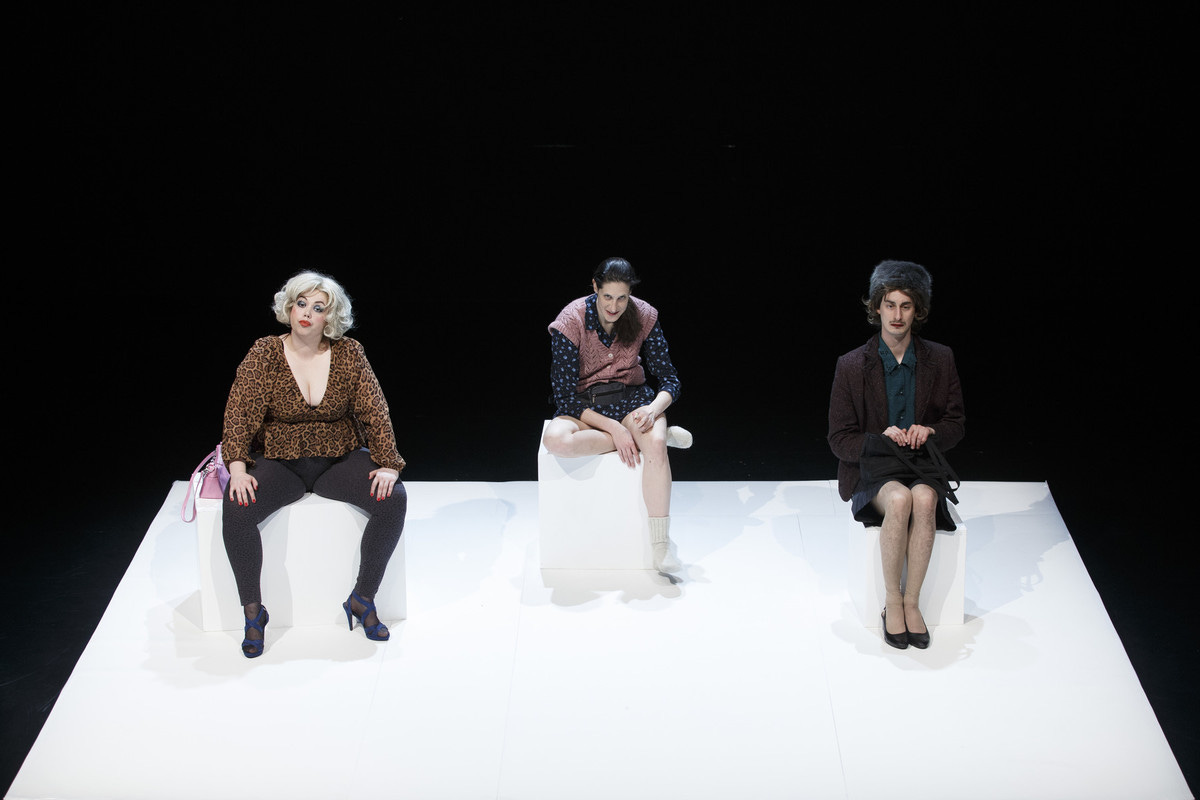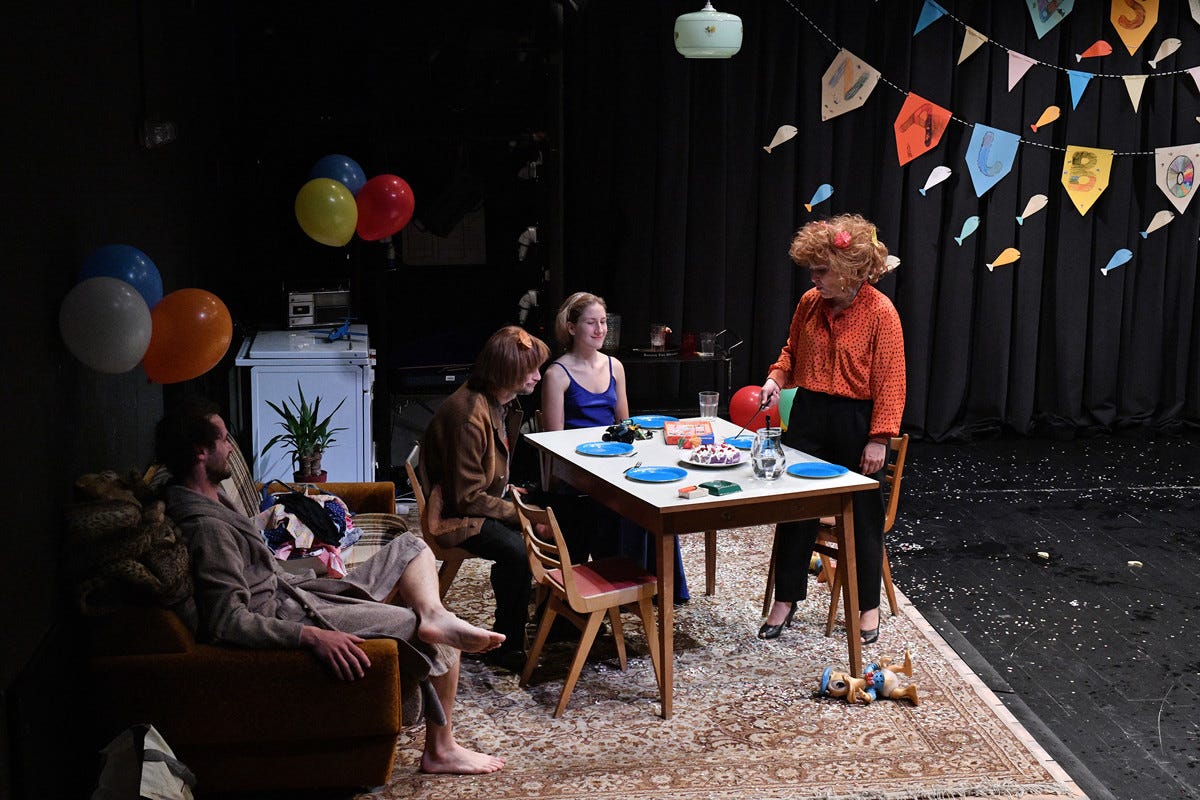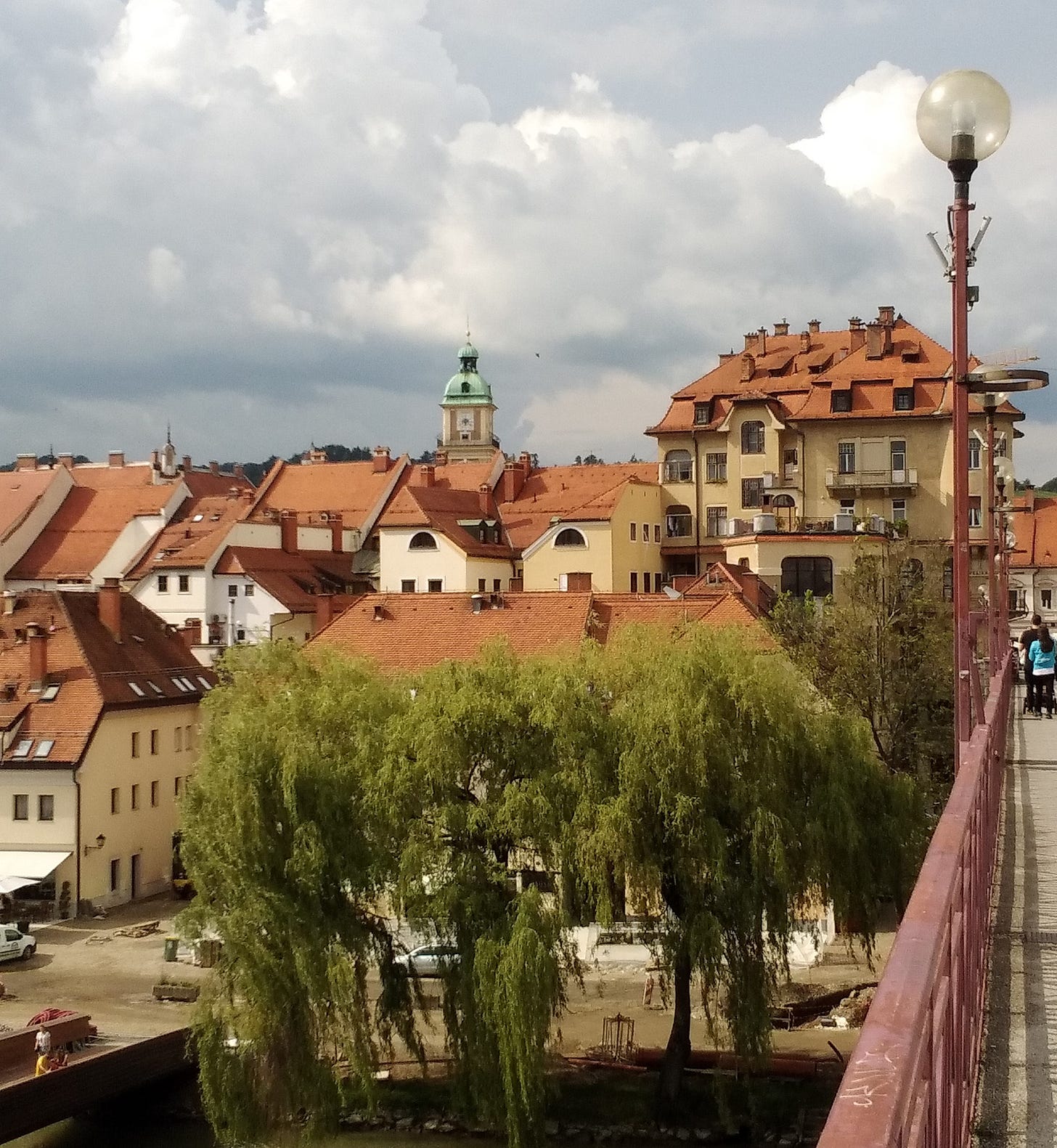Notes from a small city: Maribor Theatre Festival
A look at some of the best new work being made in Slovenia, as showcased at this year's Maribor Theatre Festival.
Welcome to Café Europa, a new weekly newsletter dedicated to European theatre. You can expect a mix of in-depth reviews and profiles of the artists and companies that excite me, plus festival coverage and other stuff.
A huge thank you to my first two paid subscribers, it really makes a difference and I appreciate your faith in me. I want to keep the content free, but any donations are obviously very welcome. You can also buy me a coffee via my Ko-fi account. If you think this kind of coverage would be of interest to people you know, please do spread the word! This week, we’re in Slovenia.
For a small country, Slovenia has a rich theatrical scene. Even though the independent sector took a battering under Janez Janša, there’s a lot of strong work being produced and a crop of young directors making formally adventurous work.
Maribor, the second-largest city in Slovenia, is home to a festival that is known in the region as Festival Borštnikovo srečanje but for simplicity’s sake is known in English as the Maribor Theatre Festival. The 58th edition of the festival took place between 5th-18th June this year and offered audiences a showcase of the best work being produced in Slovenian theatres. I saw roughly half of the works in the main competition programme.
Maribor is a very dinky city (it has a population of less than 100,000), it’s easily navigable by foot, with an old town with winding streets sloping down to the Drava river. The National Theatre (SNG Maribor) is located on a pretty square and the majority of this festival revolved around this building, and its various stages and spaces.
Sediment: The stuff of life
The show that left the deepest impression on me was Sediment, produced by Ljubljana City Theatre, directed by Žiga Divjak a young director who has made a name for himself with his brand of socially engaged, formally experimental work (he’s someone I’ll definitely be writing more about in future) and written by his regular artistic collaborator Katarina Morano.
Sediment is a story about a family dealing with loss, a group of children clearing out the flat of their recently deceased mother. Not a wholly original topic, but what struck me about the show was how the directorial concept and the text worked in perfect harmony with one another. The play took place in a realistic three-room set (designed by Igor Vasiljev, one of the most in-demand designers working in the region). Made up of a bathroom, a living room and kitchen complete with working sink, the set was filled with furniture and clutter, all the stuff a person tends to accumulate over the course of a lifetime: photo albums, books, trinkets. Over two hours, the three children - pregnant Mila, unmarried brother Blaž, and oldest sister Janja - will strip the apartment bare, packing up possessions and dismantling furniture while quibbling over who gets to keep their mother’s books.
It’s easy to imagine a version of the text performed in a more conventional way but instead Divjak lines microphones across the front of the stage and has the actors perform their dialogue to the audience instead of to each other. It’s in some ways a familiar post-dramatic tactic and yet here it serves a clear dramaturgical purpose, illustrating the emotional distance between the siblings.
As much as I enjoy Divjak’s work, I’m not sure humour is one of his strengths and yet, thanks to Morano’s sparky dialogue, Sediment is often very funny as the siblings bicker with one another. Every time they stray close to some emotional truth, to exploring their regrets about their relationship with their mother, for example, there’ll be a digression about the contents of Mila’s baby son’s nappies (he did a particularly weird shit that morning) or the conversation will go off on another tangent. The writing very successfully captures the way families interact, the everyday arguments, the mixture of sniping and tenderness.
As all this plays out, the set behind them gets emptier and emptier. Boxes pile up at the front of the stage. Everything is taken apart piece by piece, even the sofa. The space is no longer someone’s home, it’s just a container. Ingeniously Divjak doesn’t stop at this point. The process of dismantling continues. The set is taken apart by stage crew with drills. The walls come down and the ceiling disappears.
As part of a generation who lives a more transient, precarious existence because of spiralling rents, this was particularly affecting. The relationship between memory and possessions is one I think about often as I weigh up what I can afford to hold onto and what I must relinquish. It is fitting in many ways, and typically of Divjak, I think, that the final word falls to Janja’s teenage daughter. On a now empty stage, she delivers a speech about her fears for the future. She worries about the world she will inherit. She sees that many of the things her parents took for granted are no longer open to her, that her options are in many ways narrower. As performed by Lara Wolf and written by Morano, it’s an authentically meandering speech, not a rallying cry but an expression of confusion and anxiety. While the furniture in the apartment may have mid-century Yugo-aesthetic, the themes are immensely relatable and transcend cultural context. I could easily see this show speaking to a UK audience.
Holy Mothers: shit happens
Nina Ramšak Marković is a young Slovenian director with a clear fascination with issues of class and women’s position in society. Earlier this year I saw Women as Lovers based on Elfriede Jelinek’s book, as part of the Mladinsko Theatre showcase. It featured a lot of onstage woodchopping and a very brutal rape scene, but it was also darkly funny in places.
Her production of Werner Schwab’s Die Präsidentinnen feels more assured. During his brief career, the heavy drinking Schwab wrote sixteen plays over a short period before his early death in 1994. His debut Die Präsidentinnen (which is translated into English as Holy Mothers), is an aggressively, almost majestically scatological attack on the hypocrisy of Austrian bourgeoise culture.
Three women sit on white plinths like exhibits. They are Grete (Sara Dirnbek), resplendent in leopard print, Erne (played by co-producer Žan Koprivnik, complete with moustache) prim, uptight and so tight-fisted she listens outside the bathroom to make sure her degenerate son isn’t using too much loo roll, and Mariedl (Miranda Trnjani), who Ramšak Marković initially positions with her arse facing the audience. Mariedl is enormously proud of the fact that her absence of disgust at all things faecal make her peculiarly gifted as an un-blocker of lavatories. The play spends a long-time dwelling on the contents of toilet bowls.
The whole thing is an exercise in the grotesque. While the early part of the production consists of three interlocking monologues, soon the pristine white stage gets spattered with beer and other debris (if I were to create Slovenian theatre bingo, beer being liberally sloshed around the stage would definitely be on there). The trio descend into a reverie involving fingering, sexual humiliation and gallons of human effluent. Schwab delights in vulgarity and the crass as way of skewering societal faux-piety, hypocrisy, Catholicism and the country’s selective memory about its Nazi past. Schwab is also known for his wordplay, but watching a Slovenian translation with English surtitles made this difficult to appreciate. The performers all nailed the tone of the piece, particularly Trnjani who invests a character who is written as simple (think a female version of Mickey from The League of Gentlemen) and could easily have felt like an offensive caricature of someone with learning disabilities with dignity, pathos and something approaching nobility even as she’s dreaming about being shoulder-deep in shit.
Throughout Ramšak Marković and the performers injects a human note into these characters even at their most monstrous. The language gap made it hard for me to gauge how much of the text is sneering at these women, how much the social context that produced them. At times it felt like it was doing both. I couldn’t decide whether having one of the trio played by a man diluted or accentuated this.
Back in April, Ramšak Marković’s Women as Lovers prompted a lively post-show discussion about ways of staging sexual violence and misogyny. But while the audience was divided about how well that production dealt with those themes, it does feel like she is tackling certain issues – social inequality, endemic domestic violence- in a head-on way that sets her apart from some of her peers.
52 Hertz: whale song
I had even more conflicting feelings about 52 Hertz, an adaptation of Tijana Grumić’s play The Loneliest Whale in the World by SNG Nova Gorica. This melancholy coming-of-age tale about grief and loneliness takes its name from the whale whose song is at a different frequency from other whales leading him to swim the oceans alone.
While the original staging of Grumić’s text was around 90 mins in length, Mojca Madon’s production runs to three-and-a-half hours. Now, long run-times are not an uncommon feature of Slovenian theatre. Earlier this year I saw Tomi Janežič’s no title yet, a ten-hour riff on the themes of Don Juan, and I think it’s fair to say his work has influenced this new generation of makers.
The performance took place at the Maribor Puppet Theatre, which is housed in a renovated monastery. We are led into the space via the neighbouring church. Actors in clown make-up, floppy shoes and red noses offer us a glass of squash as if we are at a kids’ party. The narrative doesn’t really get going until we enter the main theatre space, where we are initially seated on the stage itself, looking out at the seating area. The story itself is relatively simple – a couple meet, fall in love, start a family. Their first child, a boy, resents the arrival of a baby sister, but they grow close, only for her to get sick.
The family scenes are warmly brought to life by the cast and often very funny, but the production also features a lot of other business, including a very long but highly entertaining digression by Matija Rupel about the perils of being an actor in which he describes getting catastrophically drunk one night. Beer gets spilt on the floor (bingo!) and he ends up skidding around the stage, soaked to the skin and swigging the dregs from his boot. There’s also a lot more literal clowning around which, if I’m honest, got a bit irritating after a while. (Though my clown tolerance level is quite low)
When we return to the space following the interval, we are re-seated in the auditorium with the actors on stage. This last section, in which the daughter succumbs to her illness, contains an extraordinary sequence in which one of the performers, Ana Facchini, emerges in a flowing blue satin dress and head-dress and proceeds to sing what I can only describe as operatic whale-song and it is soaring and melancholy and gorgeous all at once. At the end of the production, the mother of the family, now elderly and alone, her marriage having fallen apart after her daughter’s death, sots in her kitchen and listens to a song on the radio in its entirety, before the back wall of the theatre comes down and we glimpse the night sky behind her.
Mojca Madon and her co-adaptor and dramaturg Jaka Smerkolj Simoneti have taken Grumić’s sweet, small, sad play and exploded it - but it doesn’t always feel like a controlled explosion. There are some moments of great stagecraft and beauty here, but it also never justifies the long wrong time and feels padded out and repetitious. In one scene, for example, one of the actors sprints in circles around the stage (another contender for Slovenian theatre bingo) which is at once an impressive physical feat and a bit tedious after a while, unnecessarily stretched out.
Even so, I came away from Maribor, as I’ve done on every previous visit to Slovenia, energised about the work I’d seen (and also having developed quite a penchant for the locally brewed Maribor beer which I would definitely recommend).
A few people mentioned they’d appreciate some form of recommendations, a sense of what’s going on where, so here we go:
Netherlands Theatre Festival – runs until the 17th September and the programme features last year’s production of Annie Ernaux’s The Years by Eline Arbo, the young Norwegian director who recently replaced Ivo van Hove as artistic director of ITA, and Dries Verhoven’s The Narcosexuals.
Dublin Fringe Festival - runs until 24th September and features an incredibly varied programme of theatre, comedy, live art and more. Theatre highlights include Hothouse, the new show by one of my favourite fringe companies Malaprop, and Nathan Ellis’ innovate work.txt.
FIAT Festival of International Alternative Theatre - currently taking place in Podgorica, Montenegro until 17th September, with a programme including The Handke Project, Jeton Neziraj’s provocative and irreverent play about the hypocrisy of the Nobel Prize and genocide denial, and Gaia by Italian company ErosAntEros.
Thanks for reading! I’d love to hear your feedback. You can email me on natasha.tripney@gmail.com. Or you can find me on Twitter or whatever it’s called at the moment.

